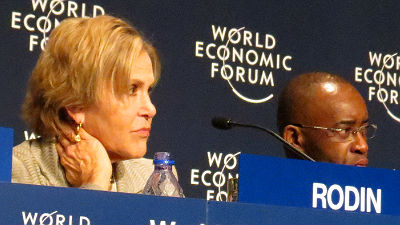The Rockefeller Foundation, led by its president, Judith Rodin, has just launched its Digital Jobs Africa initiative at the World Economic Forum (WEF), with Rodin saying “there is no better place to launch this initiative than South Africa.”
The $97 million initiative aims to reach out to African youth, especially those who are unemployed and ones in rural areas. Rodin brags that the Foundation is the first global American philanthropist body that preaches humanity. She acknowledges that “Africa today is different from the Africa we started to work with 100 years ago.” She quickly stresses: “But our work now is also more urban.”
Rodin says at the fast rate that global digital data is increasing, they don’t see it slowing down anytime soon. As a result, Rodin says the current unemployment pace is also too fast and jobs created are too little to satisfy demand. Thus, this is the reason Rockerfeller sees the need to get the African youth connected. She says the opportunity to create digital jobs is an impetus to her organisation.
South Africa, Kenya, Nigeria, Ghana, Egypt and Morocco have been identified as primary beneficiaries for the project. Rodin adds that as a result of their initiative, they expect to increase income levels for currently-unemployed African youths by between 40-200% over the next seven years.
According to Rodin, a number of local organisations have been identified to form part of the initiative and will help these youths acquire skills through proper training. This, Rodin says, will create an enabling environment for these youth.
Rodin further says the WEF creates a great platform for them to make such an announcement. She says their initiative is aimed at continually creating opportunities for generations to come.
We believe that they have the transformational capabilities to help change their countries
Joining her on the podium was Econet Wireless founder and Rockerfeller board member, Strive Masiyiwe. The latter says 20 years ago when they started, 70% of African youth never heard a phone ring, 20 years later, 70% can attest to the sound of a cellphone. He says it is for such a reason that they will continue to strive to get more African youths connected.
Masiyiwe says MTN, Vodacom and Econet Wireless have created platforms for African youths, but such are not enough yet. He says: “We as the private sector have a responsibility to help this young people.” He adds: “If we can’t help them, let’s give them tools.”
The Zimbabwe-born businessman says private business, through the Rockerfeller initiative, has the capacity to begin to unpack and use impact-sourcing to help reposition the continent. He stresses: “the greatest resource that Africa has, is its youth.”
Masiyiwe adds that they have been in talks with Telkom, Standard Bank, Standard Chartered and Accenture to provide skills training and development to youths. Rodin on the other hand says the Gates Foundation is also on board and is helping with rural agriculture skills offering, food security initiatives as well as creation of rural jobs.
Rockerfeller took the opportunity to introduce Phumla Langa, also part of the panel, who spoke of her hardships growing up in Soweto. Above all, she is now part of the Rodin Sourcing Foundation and attributes her progress to both foundations. Commenting on the role and impact of Rockerfeller on the ordinary African youths who are part of their initiative, Rodin says: “We believe that they have the transformational capabilities to help change their countries.”
– By Tshepo Tsheole, WEF, Cape Town


